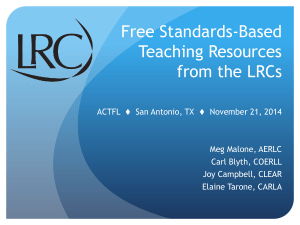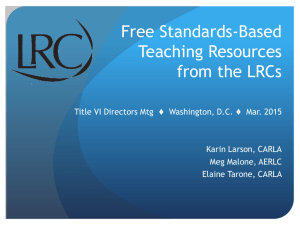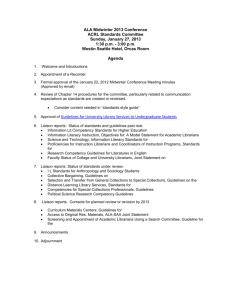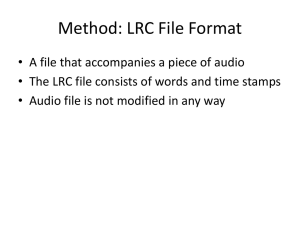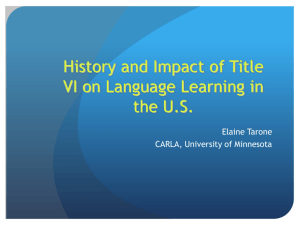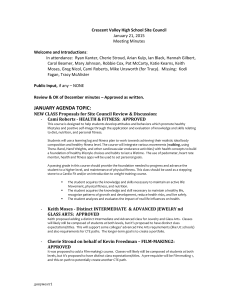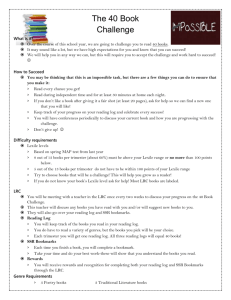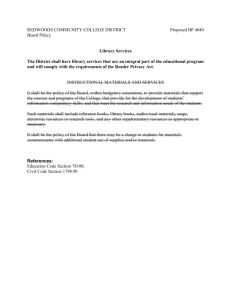Tidewater Community College LRC Collection Development Policy
advertisement
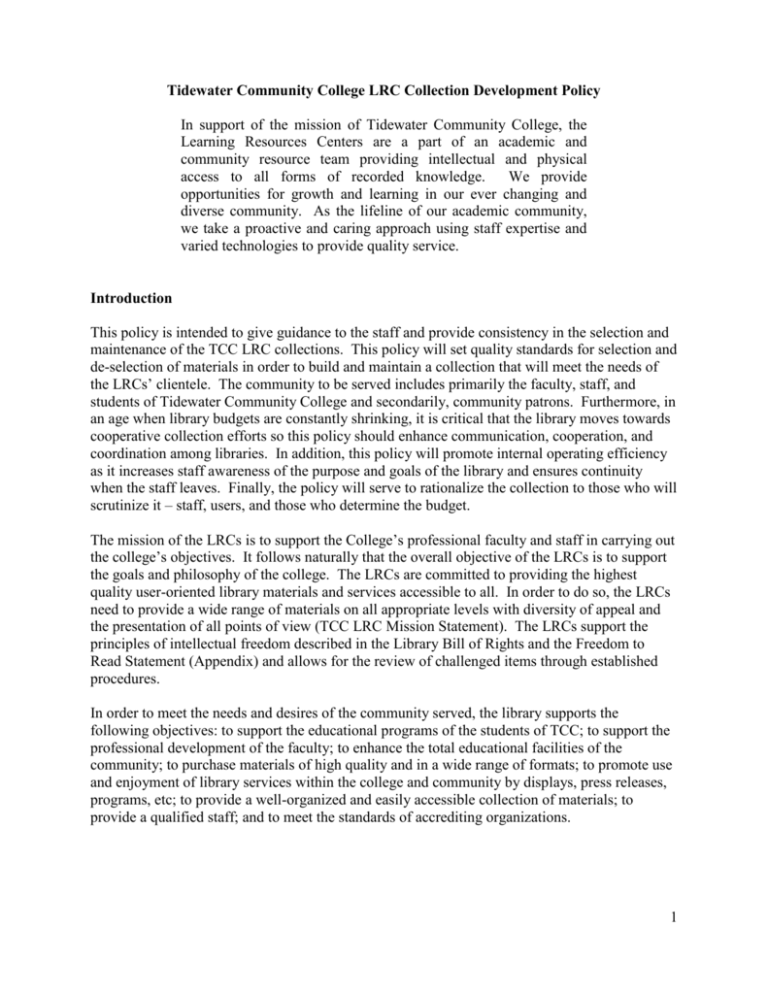
Tidewater Community College LRC Collection Development Policy In support of the mission of Tidewater Community College, the Learning Resources Centers are a part of an academic and community resource team providing intellectual and physical access to all forms of recorded knowledge. We provide opportunities for growth and learning in our ever changing and diverse community. As the lifeline of our academic community, we take a proactive and caring approach using staff expertise and varied technologies to provide quality service. Introduction This policy is intended to give guidance to the staff and provide consistency in the selection and maintenance of the TCC LRC collections. This policy will set quality standards for selection and de-selection of materials in order to build and maintain a collection that will meet the needs of the LRCs’ clientele. The community to be served includes primarily the faculty, staff, and students of Tidewater Community College and secondarily, community patrons. Furthermore, in an age when library budgets are constantly shrinking, it is critical that the library moves towards cooperative collection efforts so this policy should enhance communication, cooperation, and coordination among libraries. In addition, this policy will promote internal operating efficiency as it increases staff awareness of the purpose and goals of the library and ensures continuity when the staff leaves. Finally, the policy will serve to rationalize the collection to those who will scrutinize it – staff, users, and those who determine the budget. The mission of the LRCs is to support the College’s professional faculty and staff in carrying out the college’s objectives. It follows naturally that the overall objective of the LRCs is to support the goals and philosophy of the college. The LRCs are committed to providing the highest quality user-oriented library materials and services accessible to all. In order to do so, the LRCs need to provide a wide range of materials on all appropriate levels with diversity of appeal and the presentation of all points of view (TCC LRC Mission Statement). The LRCs support the principles of intellectual freedom described in the Library Bill of Rights and the Freedom to Read Statement (Appendix) and allows for the review of challenged items through established procedures. In order to meet the needs and desires of the community served, the library supports the following objectives: to support the educational programs of the students of TCC; to support the professional development of the faculty; to enhance the total educational facilities of the community; to purchase materials of high quality and in a wide range of formats; to promote use and enjoyment of library services within the college and community by displays, press releases, programs, etc; to provide a well-organized and easily accessible collection of materials; to provide a qualified staff; and to meet the standards of accrediting organizations. 1 Overview The LRCs contain resources in print, audio, video, and electronic format to support the courses, curricula, and mission of the college. Library materials include books, newspapers, magazines, journals, media, electronic databases, and worldwide web resources. Selection of Materials Learning resources materials are selected through a cooperative process, with participation and recommendations by faculty, librarians, staff, and students. Faculty Selection Responsibilities It is the teaching faculty’s responsibilities to recommend purchases which support the courses they teach and that offer supplemental support for their disciplines, curricula, and programs. As faculty are experts in their field, and are knowledgeable about what courses are being taught and what materials are required to support those courses, they are actively involved in previewing the media and trials of electronic resources. Librarians solicit faculty involvement in developing the collections through personal contact, printed information, website forms, membership on governance committees, and academic division meetings. Librarian Selection Responsibilities Coordination of the selection of materials rests with the professionally trained learning resources personnel. The primary responsibility for material selection is held by the librarians (both professional and administrative). They are responsible for analyzing the collection and maintaining a balanced, up-to-date collection using professional reviewing tools, bibliographies, evaluations, and their professional expertise. Ultimate responsibility for the overall selection and quality of learning resources materials on each campus rests with the Coordinators and Associate Vice President for Learning Resources. Selection Aids/Tools: No up-to-date comprehensive, yet selective, booklist is available by which to appraise a community college library. Bibliographies and reviews are the primary selection tools used by librarians. Selection is also based on patron recommendations, book reviews, professional literature, acquisition lists, and bibliographies. Selection Criteria: The criteria cited below apply to all materials but may assume greater or lesser importance depending on the type of material under consideration. Selection criteria are applied to all purchases, gifts, and exchanges. Relevancy to the college’s curricula Response to reference requests/questions Holdings of earlier editions Currency and accuracy of information Timeliness and importance of information Author/Artist/Composer’s reputation and significance 2 Availability of other material on the subject in the library, in other campus or area libraries, and formats Recommendation in standard reviewing sources Inclusion of the title in standard bibliographies or lists Price and demand Language – English only except for those items selected to support the foreign language curriculum Scope and depth of subject coverage Format, including ease of use, accessibility, and quality Reputation of publisher, producer, and vendor Duplication – single copies per campus are normally collected unless there is a need for multiple copies Special features, uniqueness Paperbound vs. hardbound. Hardbound are preferred unless material is judged to be transitory or cost prohibitive Terms or conditions attached to the item that affect use (copyright, licensing, public performance rights) Materials created for or resulting from campus/college events, with permission Types of Collections General collection: When selecting materials for the general collection, priority is given to those materials that support curricular needs. Reference collection: The reference collection is non-circulating and materials included in it will be selected in all areas where factual information may be desired. They may include the following: almanacs, directories, encyclopedias both general and subject specific, handbooks, dictionaries, statistical sources. Superseded editions may be retained in reference, weeded, or added to the general collection. Popular collection: This rental collection of popular recreational reading is cataloged on a provisional record with the option to buy at a reduced rate. This collection is shelved separately and is identified by the green band at the bottom of the book jackets. Archival collection: As staff and space allow, the LRCs will maintain a collection of materials that document the college’s history and development such as press releases, photos, etc. Periodical collection: Our periodical collection includes both scholarly and popular magazines, journals, and newspapers in a variety of formats (microfiche, print, and electronic). We provide access to thousands of titles in our full text databases provided through VIVA, the VCCS, and TCC. Reserve collection: Items, such as books and media, are placed on reserve by faculty members. Other items are not placed on open shelves due to licensing restrictions. Web site collection: We provide access to public websites. 3 Types of Materials Collections are becoming more complex with a multiplicity of formats for transferring information. No one format meets fulfills all needs, so the different types of materials must be viewed as complementary means of delivering information. Alternative sources of delivery should be evaluated, always keeping the goal of accessibility in mind. Books: Books provide a scope of historical, comprehensive, and diverse information which is not necessarily available through periodicals. Hardbound books are selected for long-term or heavy use over the paperback texts. Textbooks are not purchased but donated textbooks will generally be put in the reserve collection. Serials: When examining periodicals during the annual evaluation, consideration must be given to whether they can be accessed fully electronically; their subscription cost; indexing; relevancy to the curricula; format, and use; and if TCC is the holder of record within the state/consortium. Media: Effort will be made to purchase the most popular format, with consideration of licensing and compatibility issues. Electronic: Electronic resources extend the collection to all students—distance, online, and traditional—by providing access to information resources outside the physical boundaries of the library space and hours. In addition, electronic resources can be searched and can deliver information in ways that print resources cannot. While the majority of the electronic resources available at TCC are provided by VIVA and the VCCS, the library will acquire electronic resources locally that meet needs unique to TCC. Selection will be based on the same criteria used for other formats with the added inclusion of elements unique to the format, such as ease of use, access methods, interface options, searching and information delivery methods, etc. Duplicates: The purchase of duplicate copies of materials is acceptable when there is a demonstrated need. Gifts: The Learning Resources Centers welcome gifts of books and other materials. The receipt and handling of gifts is guided by the college’s Gift Policy. Gifts are accepted only with the understanding that the LRCs reserve the right to use those gifts according to their needs. They are evaluated and added to the collection by the librarians using the same criteria as the materials purchased. Gifts become the property of the library and must have no restrictions attached to their disposition or location. An appropriate acknowledgment of gifts received will be sent, specifying the number of books, periodicals, media, etc. donated. Monetary value will not be assigned by the LRC, but is the responsibility of the donor. Budget: The Associate Vice President for Learning Resources, with the input of the Coordinators, is responsible for library fund allocations and retains the right to shift such funds when special needs arise. The librarians are consulted on the purchase or cancellation of standing orders, periodicals, and electronic resources. This flexible budget will allow for selected growth and reductions among campuses and formats based on determined criteria. 4 Collection Maintenance Replacements: Decisions will be made continuously on how to handle worn or damaged materials—whether to mend, bind, withdraw, or replace them. LRC staff members will evaluate materials for in-house repair. Items that cannot be repaired locally will be evaluated by the librarian to determine if the item should be rebound, withdrawn, or replaced. Materials will not automatically be replaced because of damage or loss. Decisions will be based on: Demand for item Value of the individual title Number of copies already held at the college Existing coverage of the subject in the collection Availability of newer and better materials on the subject Weeding: Materials recommended for discard are reviewed by the librarians. Faculty may be consulted for input on decisions within their curricular area. Weeding should be done continuously and the collection evaluated to determine the relevancy of older materials in the collection. Final decision for removal and disposal is the responsibility of the LRC Coordinators. General criteria for weeding: No longer meets selection criteria Worn or damaged items Superseded editions Outdated, inaccurate items Obsolete formats Textbooks after 5 years Titles available in our electronic databases Space constraints Duplication Usage statistics Conservation: The LRCs should adhere to basic conservation measures, such as temperature, humidity, and dust control. Challenged Materials Professional integrity and responsibility to the academic community permit the freedom to select from a wide spectrum of significant materials. Based on the ALA Library Bill of Rights, “Materials should not be excluded because of the origin, background, or views of those contributing to their creation. Materials should not be proscribed or removed because of their partisan or doctrinal disapproval.” Occasionally, objections to some materials will be voiced regardless of the care taken in the selection process and the qualifications of the persons 5 selecting the materials. Any student or employee of the college or any citizen may formally challenge any material found in the college collection on the basis of appropriateness. Upon receiving the complaint the procedures outlined in Appendix A will be followed. Evaluation Collection evaluation examines in a systematic fashion the results of collection activity. Reasons for assessing the collection are: To identify weaknesses/strengths of the collection To determine preservation priorities To enhance staff knowledge of collection To glean information for cooperative development To analyze budget expenditures To determine effectiveness of differing formats Evaluation of the library’s collections can be achieved by observing the patterns of use; compiling statistics of the library’s holdings, annual growth, circulation, budget, interlibrary loans and intercampus loans; checking lists (standard catalogs, core lists, subject bibliographies). The LRCs also need to meet professional standards such as ACRL, SACS, and program accreditation. To maintain close contact with its clientele, surveys or questionnaires should be periodically conducted with results reported to the Associate Vice President. Documenting the quality of library collections can be used to upgrade services and collections; make library staff more responsive to users; engage user participation; justify budget requests; and provide a mechanism for goal setting. Resource Sharing: The LRCs participate in a number of cooperative agreements (Consortium, VCCS, VALC, Lyrasis, and VIVA) in support of Interlibrary Loan, a temporary loaning of materials from one library to another. In line with these agreements, a certain portion of the library budget goes towards the maintenance of materials which enhance the total holdings of the consortium members. If an item is repeatedly borrowed, it is the responsibility of the LRC to evaluate that item for purchase. Campus Autonomy vs. Cooperative Collection Development: Cooperation can result in an integrated, interdependent collection but should not be a substitute for development of adequate individual collections. Selections should be compared to avoid unnecessary duplication. Examination of existing items should be made to combine holdings for completion of sets. Revision: Recommendations for changes or improvements to the policy are encouraged. This collection policy will be reviewed every two years by the Coordinators. Any revisions, after input from the librarians, will be approved by the Associate Vice President for Learning Resources. 6 Appendix A CHALLENGED MATERIALS PROCEDURES The professional librarian faculty of the college are committed to intellectual freedom and abide by the American Library Association’s Library Bill of Rights. (http://www.ala.org/ala/oif/statementspols/statementsif/librarybillrights.htm) (http://www.ala.org/ala/oif/statementspols/ftrstatement/freedomreadstatement.htm) Procedures for the handling complaints about materials are: 1. Request that the person who objects to an item discuss the reasons privately with the LRC Coordinator. The Coordinator will provide an explanation of selection procedures and a copy of the selection policy. 2. If this is insufficient, ask the person placing the complaint to fill out a form “Request for Reconsideration of Materials”. 3. Return the completed form to the Coordinator who will forward it to the Associate Vice President for Learning Resources. 4. The Associate VP LRC and LRC Coordinators will: Read and examine material to be reconsidered Review the selection process and criteria for selection Read reviews and critiques of the materials Discuss and form opinions based on the material as a whole, not on sections taken out of context Make a written recommendation to the Coordinator on removal, retention, or replacement of the material. 5. In a timely manner, the patron will be notified in writing of the decision made. 7


